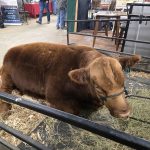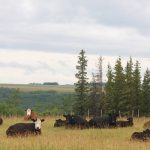Live and feeder cattle futures on the Chicago Mercantile Exchange on Tuesday recovered their losses from Monday. However, lean hog prices were mixed. August live cattle gained US$3.050 per hundredweight […] Read more
Tag Archives livestock

U.S. livestock: Cattle futures up, hogs mixed

U.S. livestock: Cattle futures come down from highs
Cattle futures on the Chicago Mercantile Exchange were weaker on Monday, coming down from recent highs.

U.S. livestock: Cattle strength continues
Cattle futures on the Chicago Mercantile Exchange were stronger on Friday, hitting fresh highs to end the week.

U.S. livestock: Cattle mixed despite fresh supply threats
Cattle futures on the Chicago Mercantile Exchange were mixed on Thursday, with fresh contract highs in the feeder cattle market while live cattle ran into resistance at their own highs to settle with small losses.

Artificial intelligence put to work on extension
Farm Credit Canada, Results Driven Agriculture Research unveil AI tool designed to produce ‘timely advice’ for farmers
Farm Credit Canada and Results Driven Agriculture Research (RDAR) have unveiled a generative artificial intelligence tool called Root

U.S. livestock: Record highs in cattle futures
Cattle futures on the Chicago Mercantile Exchange continued to set new records on Tuesday, as improving packer margins, strong demand and chart-based buying provided support. August feeder cattle futures were […] Read more

Province invests in community grazing pastures
Ontario’s growing community pastures will receive up to $5 million to boost the resilience and productivity of community grazing land. The funding was announced at the Ontario Forage Expo near […] Read more

Canadian Sheep Federation one step closer to national traceability oversight
none
The Canadian Food Inspection Agency confirmed the Canadian Sheep Federation’s eligibility as a Responsible Administrator for national sheep traceability.

Insurance costs a rising concern for Ontario farmers
Climate risks, rising replacement costs and reinsurer “hard market” impact premiums
Insurance is a growing concern within Ontario’s farming sector.

Feed Grain Weekly: Farmers still waiting on pasture
Buying activity at feedlots continue to be strong
There is still some buying activity at feedlots despite some cattle already being put out to pasture for the summer months, according to Susanne Leclerc at Edmonton-based Market Master Ltd.
